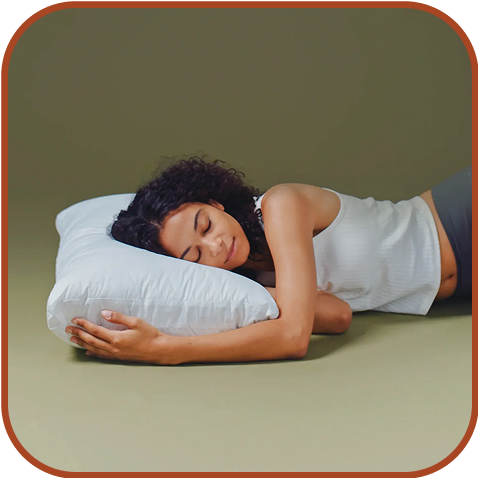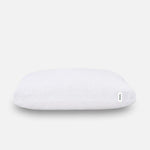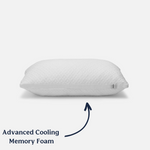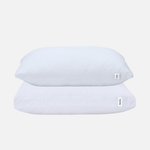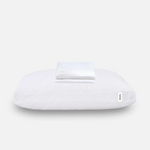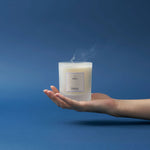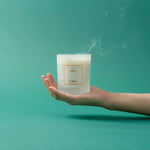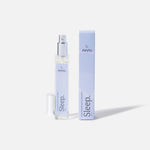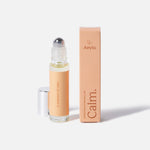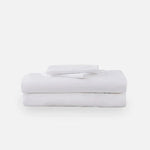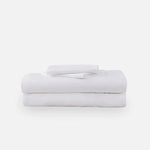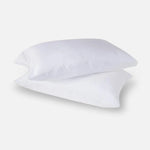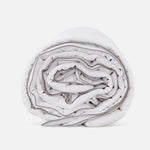Your face might be suffering when you rest your head upon your pillow night after night. While your mind may be having pleasant dreams, you may be in for a rude awakening if you’re sleeping on old or unwashed pillowcases. You might end up with pillow-related acne breakouts.
If you’re acne-prone, you may be wondering: Can a dirty pillow cause acne? The answer is a resounding yes. When it comes to acne, pillows can be the culprit. But is there a pillow good for acne? Keep reading to find out!
Changing Your Bedding Can Clear Your Face
If you’ve ever had to consult a dermatologist about your acne breakouts, you’ll likely remember hearing them tell you to make sure you aren’t touching your face. If you do, the dirt and oil from your hands can transfer to your face and block your pores, causing your acne issue to worsen. This type of acne is known as acne mechanica.
Sleeping on an old or unwashed pillowcase can cause the same issue. The oil or dirt that was left upon that pillow by your face on prior nights is trapped there. When you rest your head on it again, it gets transferred back to your skin, creating a never-ending cycle of breakout potential.
For those that want to know how to prevent acne from pillow grime, it’s as simple as washing your pillowcase regularly! Weekly as a minimum is advised. Some fabrics, like cotton, are more absorbent that others. This means they will more easily absorb oils from your your hair and face than other non-absorbent fabrics, so are more likely to contribute to breakouts.
To help prevent the transfer of dirt and oils from your face to your pillow, Yyou should also wash your face before bed. Whether you have acne-prone skin or not, it's important to keep your pillowcase as clean as possible, to help prevent clogged pores or fabric stains.
Cutting Back on the Contributing Factors of Facial Acne

We're all human. Blemishes, texture, breakouts and redness - these are all part of having real, healthy skin. At Aeyla, we're not advocates of skin ideals or striving for 'flawless', clear skin that's so often presented on the daily via social media. We are, however, advocates of clean skin, and learning about what your skin needs to be at its healthiest.
- Know your skin type: Figuring out your skin type can help you because you can tailor your skincare routine around that information. If you have oily skin, you can look for water-based skincare products that won’t produce additional oil, for example. If you have sensitive skin, you can help reduce irritants by choosing appropriate products and the proper skincare techniques. If you are unsure, a consultation with a dermatoligist can help you find the best products for your skin.
- Wash your face every morning and night: Getting that dirt, oil, makeup, and grime off your face will lead to clearer skin.
- Keep your pillowcases clean: If you wake up in the morning and your skin is worse than the night before, you might be wondering, “is my pillow giving me acne?” It is highly likely. Standard cotton pillowcases quickly absorb and retain oils and bacteria from your hair and face, gathered throughout the day. Endless laundry can be a pain, but rather than washing your entire bed set every few days, try swapping out your pillowcases every three days.If you want to opt for a cooling pillowcase, to help wick away unnecessary sweat and moisture, try our hypoallergenic, Eucalyptus Silk pillowcase.
- Shower off the sweat: If you love to break a sweat, make sure you’re washing it off as soon as possible. Workouts are great for your body, but can be bad news for your skin if you don’t remove the sweat promptly.
- Watch your food triggers: Some experts believe acne can be triggered by what goes in our mouths. If you think food could be a trigger, keep a diary when eating foods such as chocolate, sugar, white rice, white bread, and dairy products like cheese and milk, to see if you notice any trends.
- Skip the fabric softener: For some people, fabric softeners appear to be an acne trigger because of the chemicals or the fragrance used. They also contain softening agents that leave behind a waxy residue and can contribute to blocked pores. So even fragrance-free fabric softeners can be problematic. If you’re struggling with blemishes, it’s a good idea to eliminate the fabric softener entirely and see if that helps you.
- Look for noncomedogenic products: Any makeup or moisturiser you choose should say noncomedogenic on the label, especially if you have oily skin. That simply means the product shouldn’t cause acne by blocking your pores.
- Watch out for stress triggers: Have you ever noticed that you experience a breakout right during a severely stressful time? You’re not alone -- it happens to many of us. Try to establish a de-stressing routine or ritual, that you can turn to in those times. It could be a form of meditation, exercise, or an hour in the bath with Pretty Woman on. Find whatever works for you, and train yourself to see it as 'switch off' time.
- See a dermatologist: When all else fails, you may want to consult a professional to see what can be done to improve your acne or breakouts.
How can a silk pillowcase help?
Example: Think of your silk pillowcase as the cherry on top of your skincare routine. If you suffer from hormonal acne, a pillowcase isn't going to stop breakouts, but it will minimise the problem by making for a healthier, cleaner sleeping environment, and is a much better option than cotton. Silk is a natural fibre that does not clog pores, it won't absorb moisture or products – making it healthy for the skin in general.
As silk is also smoother, tightly woven fabric, it will be smoother on your skin and cause less friction and rubbing on your skin, which can help to reduce redness. If your skin is particularly sensitive, it will help to reduce puffiness and swelling. It's not the end-all-be-all for acne-prevention but it can help in preventing it and relaxing facial skin altogether. Think of it as an extra step to your skincare routine. Silk pillows are the best pillows for acne-prone skin, no doubt about it!
If you’re looking for a silk pillow for acne, Aeyla’s eucalyptus silk pillowcases are ideal. Using sustainably sourced eucalyptus silk, these pillowcases can help prevent the clogging of pores and the build-up of grime. They are also hypoallergenic so are perfect for people with sensitive skin! Choose from white, pastel pink or stone, depending on your taste.
Don’t Let Acne Blemish Your Life
Pillows and acne are closely linked. But Yyou don’t have to let your beauty sleep work against your skin. Having the occasional breakout may be unavoidable, but by keeping your pillowcase clean and using the right fabric, you’ll help keep your skin healthy while you're resting.
